Amos Harel עמוס הראל | |
|---|---|
 | |
| Nationality | Israeli |
| Alma mater | Tel Aviv University [1] |
| Occupation | Journalism |
Amos Harel is an Israeli journalist.
Amos Harel עמוס הראל | |
|---|---|
 | |
| Nationality | Israeli |
| Alma mater | Tel Aviv University [1] |
| Occupation | Journalism |
Amos Harel is an Israeli journalist.
He graduated from Tel Aviv University and lives in Hod Hasharon. [1]
As of 2014 he is the military and defense analyst for the Israeli newspaper Haaretz . [1] [2]
From 1999 to 2005 Harel anchored a weekly program about defense issues on Army Radio. [1] Before becoming the military analyst for Haaretz, he spent four years as the night editor of the printed Hebrew edition. [1]
In the year leading up to the war in Gaza, Harel's work was very critical of Itamar Ben Gvir and other far right members of the Knesset. Harel repeatedly expressed concern that Ben Gvir’s far right policies, provocative actions, and "Chutzpah" [3] would lead to a "third intifada".
This was a common concern in Israel in the year before October 2023, but went largely unnoticed except in media focused on the Middle East. [5] [6]
However, Harel did not foresee the escalation coming from Gaza, instead he predicted increased violence in the West Bank and Jerusalem. [4] On the 6 October 2023 he wrote, "It's Not Yet an Intifada, but the West Bank Is Heading Towards an Eruption". [7]
This timeline of the Israeli–Palestinian conflict lists events from 1948 to the present. The Israeli–Palestinian conflict emerged from intercommunal conflict in Mandatory Palestine between Palestinian Jews and Arabs, often described as the background to the Israeli–Palestinian conflict. The conflict in its modern phase evolved since the declaration of the State of Israel on May 14, 1948 and consequent intervention of Arab armies on behalf of the Palestinian Arabs.

The 84th "Givati" Brigade is an Israel Defense Forces infantry brigade formed in 1947.
Chutzpah is the quality of audacity, for good or for bad. A close English equivalent is sometimes "hubris". The word derives from the Hebrew ḥuṣpāh (חֻצְפָּה), meaning "insolence", "cheek" or "audacity". Thus, the original Yiddish word has a strongly negative connotation, but the form which entered English as a Yiddishism in American English has taken on a broader meaning, having been popularized through vernacular use in film, literature, and television. In American English the word is sometimes interpreted—particularly in business parlance—as meaning the amount of courage, mettle or ardor that an individual has.

Breaking the Silence (BtS) is an Israeli non-governmental organization (NGO) established in 2004 by veterans of the Israel Defense Forces (IDF). It is intended to give serving and discharged Israeli personnel and reservists a means to confidentially recount their experiences in the Occupied Territories. Collections of such accounts have been published in order to educate the Israeli public about conditions in these areas.
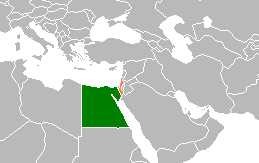
Egypt–Israel relations are foreign relations between Egypt and Israel. The state of war between both countries which dated back to the 1948 Arab–Israeli War culminated in the Yom Kippur War in 1973, and was followed by the 1979 Egypt–Israel peace treaty a year after the Camp David Accords, mediated by U.S. president Jimmy Carter. Full diplomatic relations were established on January 26, 1980, and the formal exchange of ambassadors took place one month later, on February 26, 1980, with Eliyahu Ben-Elissar serving as the first Israeli Ambassador to Egypt, and Saad Mortada as the first Egyptian Ambassador to Israel. Egypt has an embassy in Tel Aviv and a consulate in Eilat. Israel has an embassy in Cairo and a consulate in Alexandria. Their shared border has two official crossings, one at Taba and one at Nitzana. The crossing at Nitzana is for commercial and tourist traffic only. The two countries' borders also meet at the shoreline of the Gulf of Aqaba in the Red Sea.
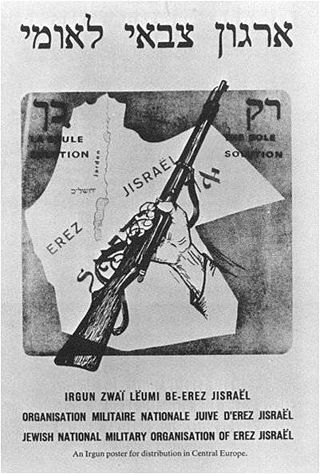
Jewish fascism is a term that is applied to Jewish political factions which are on the far-right wing of the political spectrum.
Events in the year 2006 in Israel.

Otzma Yehudit or Jewish Power is a far-right, ultra-nationalist, Kahanist, and anti-Arab political party in Israel. It is the ideological descendant of the outlawed Kach party.
Sergeant Almog Shiloni of the Israel Defense Forces was killed on 10 November 2014 after he was stabbed multiple times at Tel Aviv HaHagana Railway Station. He died in hospital from his wounds. Shiloni was off-duty, but in uniform and armed at the time.

Avi Issacharoff is an Israeli journalist, known for his focus on Palestinian affairs. He is a Middle East commentator for The Times of Israel and its sister news outlet Walla!, and the Palestinian and Arab Affairs Correspondent for Haaretz. Issacharoff is known as one of the creators of the TV-series Fauda.

Gal Hirsch is an Israeli former military commander and author. As Brigadier General, he commanded the 91st Division of Israel Defense Forces (IDF) during the 2006 Lebanon War.

Itamar Ben-Gvir is an Israeli far-right politician and lawyer who has served as the Minister of National Security since 2022. He is the leader of Otzma Yehudit, a Kahanist and anti-Arab party that won six seats in the 2022 Israeli legislative election, and is part of what is widely regarded as the most right-wing government in Israel's history.
On 30 May 2020, Eyad al-Hallaq, a 32-year-old unarmed autistic Palestinian man, was shot and killed by Israeli Police in East Jerusalem of the Israeli-occupied West Bank.
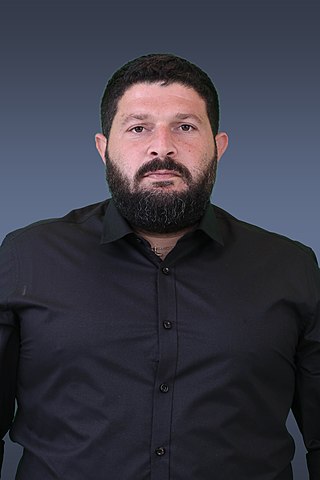
Almog Cohen is an Israeli far-right politician, former police officer, and militia founder from the city of Beersheba in the Negev region. He has served as a member of the Knesset for Otzma Yehudit since 2022. He has served as a regional coordinator for the party. Owing to his police and militia background, Cohen acquired nicknames including "the sheriff" and "the warrior from the Negev" within the party.
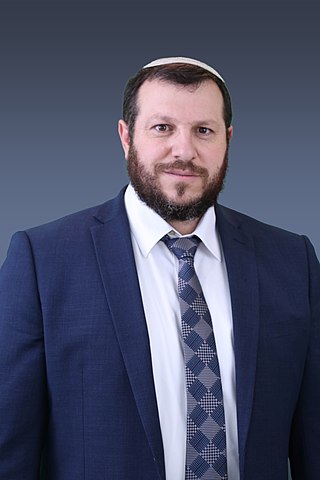
Amihai Ben-Eliyahu, commonly known as Amihai Eliyahu, is an Israeli far-right politician and activist who has been serving as Minister of Heritage since 2022. Eliyahu also briefly served as a member of the Knesset for Otzma Yehudit following the 2022 Israeli legislative election.

The thirty-seventh government of Israel is the current cabinet of Israel, formed on 29 December 2022, following the Knesset election on 1 November 2022. The coalition government consists of six parties — Likud, United Torah Judaism, Shas, Religious Zionist Party, Otzma Yehudit and Noam — and is led by Benjamin Netanyahu, who has taken office as the Prime Minister of Israel for the sixth time. The government is notable for its inclusion of far-right politicians.

The Israeli government's response to the 2023 Hamas-led attack on Israel has multiple aspects, including a military response leading to the Israeli invasion of the Gaza Strip. In October, the Knesset approved a war cabinet in Israel, adding National Unity ministers and altering the government; Benjamin Netanyahu and Benny Gantz froze non-war legislation, establishing a war cabinet with military authority.
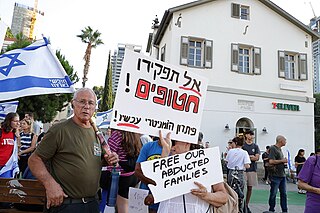
As a result of the Israel–Hamas war, nationwide protests have occurred across Israel, including rallies, demonstrations, campaigns, and vigils. These demonstrations occurred as part of broader war-related protests occurring worldwide. Israelis domestically and abroad have primarily called for the return of hostages held by Hamas.